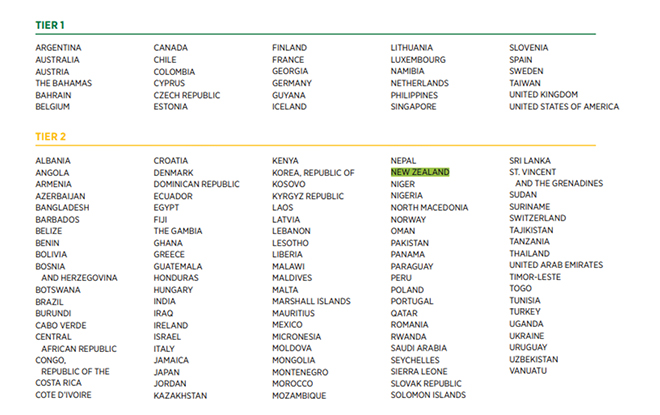New Zealand fails again to meet standards on human trafficking
13156 0
According to the 2022 Trafficking in Persons (TIP) Report, “The New Zealand Government does not fully meet the minimum standards for the elimination of trafficking.”
After its disconcerting drop from Tier 1 to Tier 2 in last year's report (where it had ranked since 2004), New Zealand has remained on the Tier 2 list.
The TIP Report ranks global governments into tiers, not based on the size of a country’s problem, but on their efforts to recognise and eliminate human trafficking. The report assesses whether governments are meeting the minimum standards for the protection of survivors, the prosecution of offenders, and the prevention of trafficking in line with US law, which is generally in line with UN international guidelines.
The bottom line: New Zealand isn’t protecting people from human trafficking.

New Zealand ranked Tier 2 in this years TIP report. While Australia, the United States and the UK ranked Tier 1.
Here’s what you need to know from this year’s report.
The problem
Human traffickers exploit New Zealanders and foreigners in Aotearoa. People are particularly vulnerable to forced labour in our agriculture, dairy, construction, viticulture, food service, liquor retail, technology, hospitality, transport, and domestic service sectors. Temporary migrant workers in sectors that were most negatively affected by the pandemic, such as tourism and hospitality, were also increasingly vulnerable to exploitation over the past year. The report also highlights that sex trafficking among New Zealand women is significantly under-reported and under-detected.
Let’s start with the good
The government demonstrated that overall, it had increased its efforts to combat trafficking compared to the 2021 report. These efforts included investigating three potential cases of trafficking, finalising new training programmes for frontline workers on identifying and investigating trafficking incidents and creating a new visa category and reporting mechanisms for exploited migrant workers. The report also acknowledged our call for a Modern Slavery Act, saying “The government established an advisory group composed of government officials, NGOs, businesses, academics, and trade unions to consider legislation addressing human trafficking in supply chains.”

The bottom line: New Zealand is not protecting people from human trafficking.
And now onto the bad
Despite these increased efforts, the government failed to meet the minimum standards set out by international law. Even with trafficking being a prevalent problem in New Zealand, the government did not initiate any prosecutions, convict any traffickers, or formally identify any victims over the last year. Although frontline workers received increased training on identifying trafficking victims, the government continues to lack a system to formally recognise them.
Another major issue is that New Zealand’s law on child trafficking is not in line with international law, as it requires evidence of deception or coercion and therefore does not criminalise all forms of child sex trafficking. The TIP Report also found that the government wasn’t consistent in responding to complaints made by exploited migrant workers, and relevant agencies did not effectively coordinate investigations into potential trafficking cases. The report also found that police didn’t know how to identify cases of trafficking among victims of domestic or family violence, therefore cases went unnoticed.
Lastly, even though there is evidence that sex trafficking occurs in New Zealand, particularly of female victims of family violence, the government has still never identified an adult New Zealander as a victim of sex trafficking. The lack of efforts by law enforcement to treat cases appropriately results in a failure to hold traffickers accountable, protect victims, and ultimately minimises the prevalence and awareness of sex trafficking as a crime in New Zealand.
So, what are some solutions?
The TIP report provides recommendations for the government, some of which include increasing efforts to proactively investigate and prosecute trafficking cases, improving access to materials on migrant workers’ rights and channels for reporting exploitation, and increasing coordination with NGOs, social service providers, and civil society on anti-trafficking efforts.
In collaboration with other Kiwi NGOs and businesses, Tearfund has spent the last year calling on the government to implement a Modern Slavery Act, which would require businesses to take responsibility for the workers in their supply chains. This means they’ll need to know who is making or growing their products and how they’re treated. The TIP report says exploited workers in New Zealand “are charged excessive recruitment fees and experience unjustified salary deductions, non- or under-payment of wages, excessively long working hours, restrictions on their movement, passport retention, and contract alteration”. A robust Modern Slavery Act would require companies to proactively investigate their supply chains for these exploitative tactics to help uncover cases of trafficking, and it would provide a path to remedy for the survivor.
In April, the government responded to our pressure and put forward a public proposal for modern slavery legislation. Thanks to the support of many of you, we reached over 1,400 submissions! Together with World Vision and Trade Aid, we contributed about 5,000 submissions. This level of public support has sent a strong signal to the government to introduce modern slavery legislation to help eliminate labour trafficking.
Every year, the TIP report makes it clear: there's no escaping the reality of modern slavery, but governments have a responsibility to use their power and resources to help eliminate it.
In the meantime, here are some ways you can spread awareness and advocate for change:
- Educate yourself. Check out our modern slavery video series, and share your knowledge with your friends and family!

Ido Drent and Morgan Theakson have a conversation about slavery in supply chains in Tearfund's new Modern Slavery video series.
- Write to your local MP and demand that the government increase efforts to eliminate human trafficking in New Zealand. Request that they amend section 98D of The Crimes Act of 1961 so that it no longer requires deception or coercion to constitute a child trafficking case.
- Become a Tearfund Advocate and spread awareness at your church.
How will you take action?